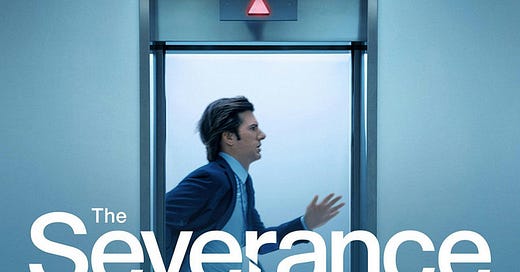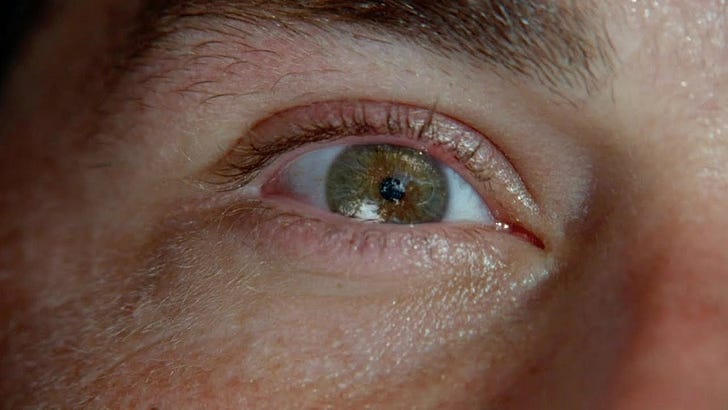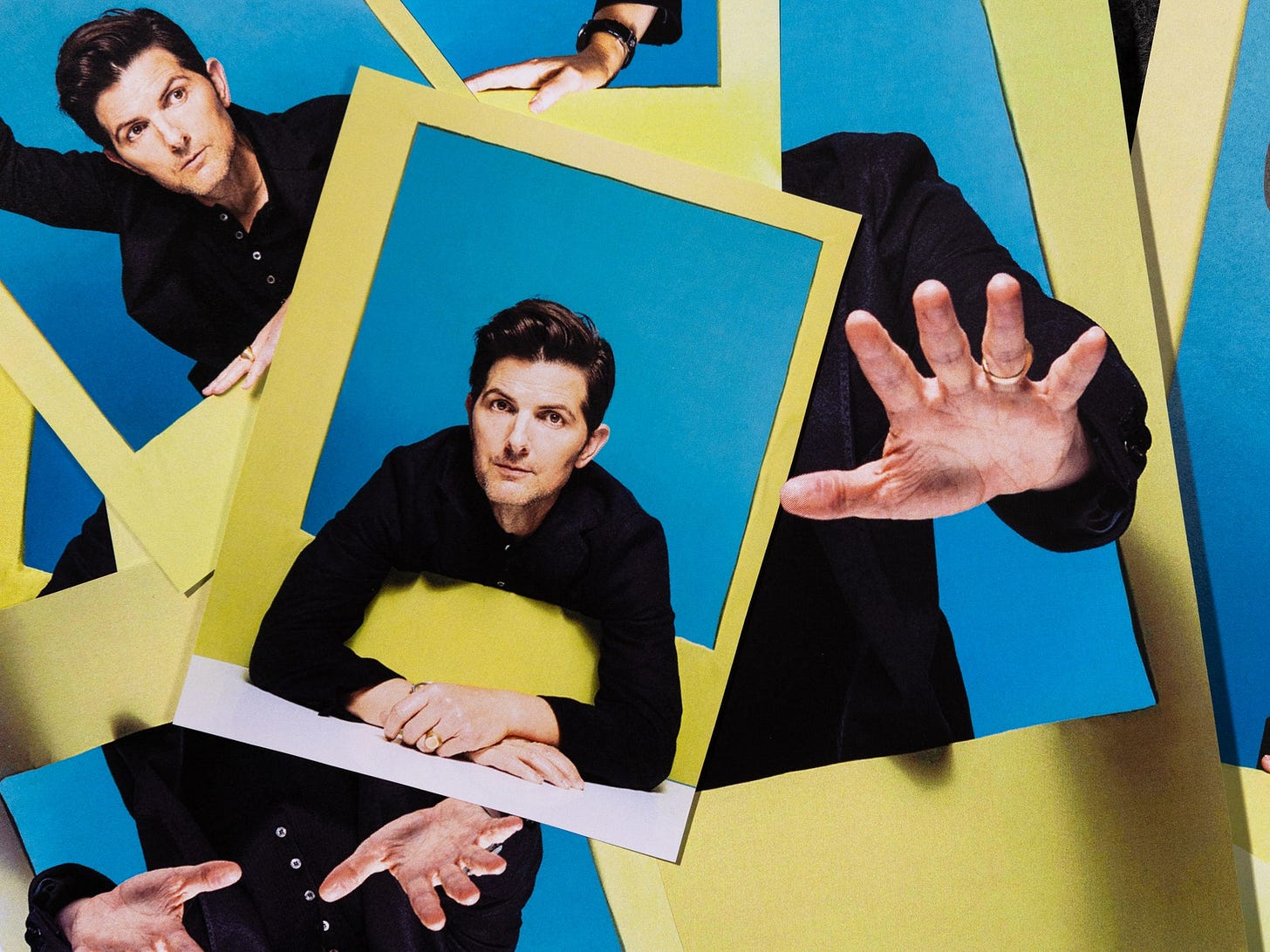Hello, Tox Nation! I’m still in the middle of building work and some other difficult stuff, so this is a slightly all-over-the-place newsletter that starts with some thoughts on the inauguration and then lurches into a quick Severance chat (with spoilers for all Severance episodes to date, you have been warned). If there’s a unifying theme in here, by all means let me know and I’ll edit it in so I look clever.
Trump season 2, huh. I’m writing this on Monday morning. This time eight years ago, I was sitting in a meeting of the Abortion Rights campaign group executive committee; when it finished, I went to join the Women’s March with my friend and fellow EC member Ellie. My overriding feeling, even by the day of the inauguration, was something along the lines of “this cannot be happening”, and though I was never very clear what the specific aims of the Women’s March were (and nor apparently were the organisers, given how quickly the leadership fell to pieces), it felt good to be in a crowd of people who shared that disbelief.
It’s easy to satirise the person I was at that time — which is to say, a person who had held the “normal” run of things as an article of faith and, however much I had feared the possibility of a Trump win, I did not really have space in my philosophy for the fact of it. If you’d asked me, I would have said that of course he could win, and in fact made that point several times in arguments with anti-Hilary leftists. But a practical possibility can still be a moral impossibility in your own mind.
I’d actually been commissioned to write a piece for a women’s-interest website in advance of a Hilary victory. The editor had suggested also filing a backup in case of the worst, but as her idea had been an article on “X reasons why Trump’s presidency might not be so bad”, and my research suggested an honest statement of the value of X would be a big fat zero (on account of the American constitution’s almost total lack of constraint on executive powers), I hadn’t done that.
Instead, I stayed up for the result of the 2016 election, had a couple of miserable and anxious hours sleep on the sofa in front of BBC News, and then turned out a column addressed to my daughter who was 10 at the time and had been genuinely psyched for Hilary. I find that column embarrassing now — liberals writing to their children was already a cliche (thank you, Ta-Nehisi Coates) — but then, what else was I supposed to feel? The biggest western democracy had just voted a self-confessed pussy grabber in as president. You try explaining that to a ten-year-old.1
The world had seemed to be on that long arc towards my idea of justice, and then it wasn’t.2 Even when Trump was out of office, as Ezra Klein points out in his column this week, he still consumed all the energy of American politics. Now, his success feels total, despite the narrowness of his win in the popular vote, and a big part of that feeling is the way that corporations and the media have trimmed their sails towards the prevailing wind.
Mark Zuckerberg ending factchecks on Facebook is not, in itself, the end of democracy (Charles Arthur argues that factchecks on Facebook were probably ineffective at best, and possibly counterproductive in that they gave the false impression that everything on there was verified). Jeff Bezos telling the Washington Post not to endorse Harris3 didn’t swing the election. But both of these show how power is drawing towards power. “Trump’s cultural victory has lapped his political victory. The election was close, but the vibes have been a rout,” writes Klein.
That rout comes with risk. Klein again: “The politics that Democrats absorbed from Twitter in 2020 hurt them in 2024. Politicians who are too in touch with their online stans lose touch with normal voters. Their sense of the public — who it is, what it wants — deforms.” That inauguration day Abortion Rights meeting was the last I attended, because when the next AGM came round, I was unceremoniously booted for my bad gender beliefs. Luckily, abortion activism in the UK wasn’t reliant on that one group in the same way that Planned Parenthood dominates in America, but it was a small sign of the unhealthy shift in the anglophone left.4
What looked, initially, like a healthy mass protest movement against Trump degenerated quickly into a poisonous and self-serving racket; the Resistance™ turned out to be a bunch of attention grifters. The dire predictions of an apocalypse for democracy never came to pass in Trump’s first term. (Apart from that little business with the attempted coup at the Capitol, but as David Frum writes, quoting Donald Draper: “This never happened… It will shock you how much it never happened.”) Maybe everything will be fine in this term, too.
It’s not going to be “fine” though, is it? Trump season one was bad. The reboot has a servile media and corporate class, and a much more ruthless coterie around him. If you think Steve Bannon was scary, wait till you meet the new breed of supervillains who aren’t wasting all their energy monologueing. Peter Thiel, whatever you think of him, gets shit done (something I write about in my book Toxic). I am sorry to sound like the kind of hysteric who would write a column in the form of a public letter to her child (ugh, gauche): this time, it’s going to be worse.
Listened
The Severance Podcast with Ben Stiller and Adam Scott (Spotify/your preferred podcast service)
I’ve been so excited for the return of Severance, but also nervous: the cliffhanger at the end of season one was so beautiful, and the sci-fi concept so deftly established, it was impossible not to worry that they’d mess it up. (If you haven’t watched it yet, the conceit is that a company called Lumon has devised a technology that splits its employees’ consciousnesses between a “work self”, called the innie, and a “home self”, called the outie. Neither innie nor outie has access to the other’s memories or experiences, though they share the one body.) And by “mess it up”, I mean “do a Lost”, which is the high water mark of promising wonder and delivering garbage.
It’s also been three years since the first season — the kind of gap that can only make a hopeful viewer twitchy. To ease you into the show’s return, executive producer Ben Stiller and lead actor Adam Scott have recorded a companion podcast, rewatching episode-by-episode. (Season two podcasts are coming out alongside the new episodes.) It’s a joy to hear two people who clearly have a great creative relationship talking about how they do it, and if you’ve got any interest in how on-screen storytelling works, you will find this fascinating.
Watched
Severance season 2, episode 1 (Apple TV)
Let me reassure you: the wait was worth it. Season two starts with a gloriously confident tracking shot as Adam Scott’s character Mark S (the innie, and this whole episode is seen from the claustrophobic innie perspective) races through the Severed floor of Lumen, looking for a woman he knows as Miss Casey but who he now knows is also his outie’s supposedly dead wife. It’s a perfect Severance moment, because it’s simultaneously funny, frightening, stylish and character-driven. Not many shows can be constantly surprising while also being just right moment-to-moment.
Two snatches of dialogue I think set up the big conflict for the innies this season. First, when Mark S tells Dylan (Zach Cherry) about a new set of coworkers he was given who have now vanished, Dylan says: “Fuck them, they deserve to die.” (For an innie to never come back to work is effectively death.) Dylan’s wish is to be integrated with his outie, who he knows has a son. But when Mark S asks Helly R (Britt Lower) to help him find Miss Casey, she agrees, not because Miss Casey is married to Mark’s outie, but because Miss Casey is an innie like them: Helly hates her own outie and wants to destroy her. Do you owe your loyalty to the “you” outside Lumon, or the other innies within? It’s a good question that’s liable to throw up a lot of drama.
Read
Rachel Syme, “The Hollywood slog that led Adam Scott to Severance” (New Yorker)
Adam Scott is, to me, a big fucking deal: he’s had breakout parts in two of my favourite recent sitcoms (Parks and Rec and The Good Place), and if you’d asked me to guess, I’d have assumed he was never in doubt for Severance. Not so: according to this profile, he had to re-audition for a role that was originally written with him in mind after Apple decided it was unconvinced of his ability to carry a series as the star. The Microserf-style existence of Lumen employees seems a million miles away from Hollywood glamour, but it’s a good reminder that for most actors, their job is a relentless ego mincer and surprisingly good method prep for the love-bombing cruelty of Lumon.
Gimme, gimme more…
“‘I think that they don’t know what “change the world” means,’ says the person who worked in media projects. ‘They want to be people who are looked at as people who want to change the world.’” Big profile dishing on the Harry and Meghan machine, which made me think these people have chosen to live in a kind of hell: desperately seeking an identity away from the royals, but only even remotely interesting because of their royalty. (Vanity Fair, free to read.)
“Unfortunately, unless her writing is so aggressively unpleasant that you can’t even coax one cute pull quote from it, just about any great woman writer ends up getting turned into a lifestyle brand. When some sort of literary scandal breaks—currently, Neil Gaiman — suddenly a bunch of people pop up to say, hey, did you ever read Ursula K Le Guin, who never did anything wrong in her entire life?” BD McClay on the coastal grandmafication industrial complex, winning bonus points for the rave about Joanna Russ. (Notebook via Substack, free to read.)
Very, very sad about David Lynch, whose death feels like the closing up of a portal into a weirder version of the universe. Life permitting, I’ll write about him properly next week but I wanted to pay tribute to one of my favourite bits of his work: the angriest dog in the world. This strip doesn’t really work in isolation but it’s definitely the vibe today.
I think my initially filed piece was published in the end, with a headline like “the column I would have written had Hilary won”, as a second-bite-of-the-traffic-cherry after the letter to my daughter went semi-viral. But I am too embarrassed about the whole thing to check that now.
I actually think America would be in a very similar position today had Hilary won in 2016. However much I respect her achievements (a lot), I doubt very much that she would have brought forward the new generation of talent that the Democrats need, or avoided the dumbfuck identity beartraps that Biden and Harris plunged into.
OK, not to endorse anyone rather than specifically not to endorse Harris, but if they were going to endorse anyone, it was going to be Harris.
One thing I feel very strongly about — partly from my experience with Abortion Rights, which by the time I was involved had become less about campaigning for abortion rights than about using abortion to burnish other left-wing causes — is that abortion should be a non-partisan issue. (Seriously, the main subject of discussion in those meetings was which anti-austerity march the banner should be taken out on.) Luckily the British Pregnancy Advisory Service, which is actually the UK’s most prominent pro-choice organisation, is run on hardline libertarian principles and they DGAF about anything that isn’t abortion.








I don't think you should feel embarrassed for those columns. They were honest and heartfelt and there is nothing shameful about that, whatever the heterodox cynics might try to make us feel. We are human beings, we are allowed to have feelings ❤️
I also read Klein’s piece in The NY Times and listened to his podcast episode discussing attention with Chris Hayes. A lot of Klein! But I like the way that he thinks.
The attention and energy consumption of Trump and co is exceptional. But they know this and I think it was Bannon who said something about swamping people with information (?) to effectively prevent people from thinking for themselves. It’s Trump Season 2 😬